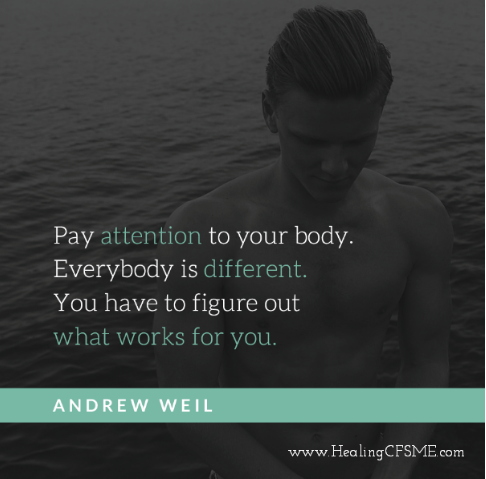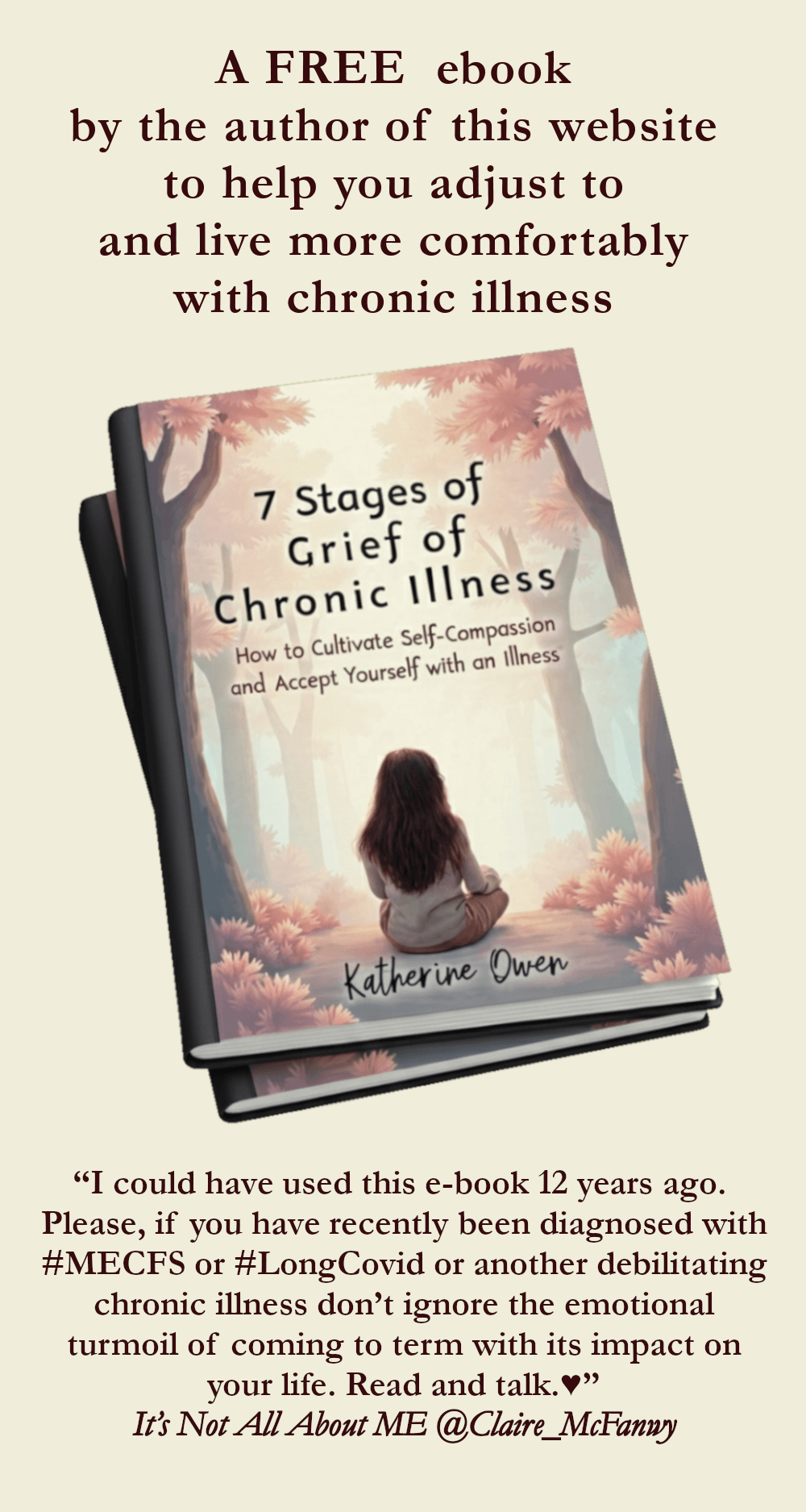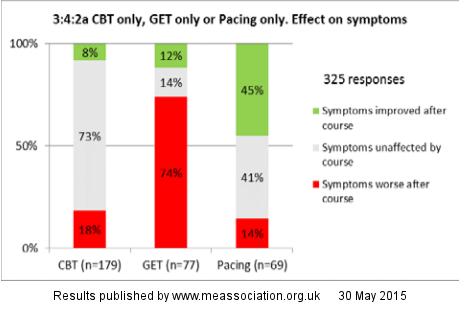and move towards health
The
danger of exercise for a person with ME CFS
Research into why harmful
The
danger of exercise for a person with ME CFS.
Scientific research shows that for someone living with the illness CFS/ ME it is not safe to exercise in the normal sense of the word.
CFS = Chronic Fatigue Syndrome.
ME = Myalgic Encephalomyelitis.
Or click here to CHOOSE FROM
A RANGE OF personalizable cards and gifts.
The healing-themed gifts are designed by myself, Katherine, the author of
this website HealingCFSME.com
Proceeds go towards the cost of the website. Thank you. Enjoy!
Contents
Please scroll down
Research into how a person with ME /CFS needs to avoid exercise beyond their limits
- People with CFS/ME report symptoms worse after graded exercise
- Effect of acute exercise on fatigue in people with ME/CFS/SEID: A Meta-analysis
- Harms associated with Cognitive Behavioural Therapy and CFS
- The PACE trial for Chronic Fatigue Syndrome / ME
Doctors who support ME/CFS patients in taking appropriate rest.
- Quotes from doctors related to the danger of exercise for a person with the illness ME CFS
Find the following in an additional article on Why do I feel worse after exercise?
- Research showing acid accumulation in the muscles of those with CFS/ME
- Research: Post exertional fatigue found in people with Myalgic Encephalomyelitis
- The duration of postexertional malaise symptoms following a known stressor
Reading about this ME and Chronic Fatigue Syndrome research can be highly validating if you are feeling upset that you can’t exercise as much you would like to do.
It may also help you with benefits claims or with explaining to loved ones why you can’t engage in activities in the way you would like to do.
Disclaimer. My area of interest is how to meet the feelings and challenges of living with chronic illness with compassion.
I am not an expert on the research. I have quoted names and papers where possible so that you can investigate further.
ME and Exercise: People with CFS/ME report symptoms worse after graded exercise
When: Published 30 May 2015
What: a survey to determine the response of people with ME (Myalgic Encephalomyelitis) to a course of Cognitive Behavioural Therapy (CBT), Graded Exercise Therapy (GET) or pacing.
Who published the report: The ME Association, a UK based charity.
Number of participants: 1428 people with CFSME answered the questionnaire.
Results: Amongst many other findings, this
extensive report finds that 74% of patients with CFS/ME became more ill as a result of GET
- Graded Exercise Therapy.
“…the majority of patients attending Pacing courses with no overlapping elements found this management approach more appropriate to their needs than did those who attended either CBT only or GET only courses.”
Where can I read more? At the time of writing, you can download the report showing the danger of exercise for a person with ME from the ME Association website.
Katherine T Owen comments:
Congratulations and gratitude to the ME Association for this extensive study and report into the potential danger of exercise for a person with ME /CFS.
I know from first hand experience
what it is like to be pressured to engage in a ‘treatment’.
I was threatened to
have my care provision taken away if I did not do so.
I am so pleased that this research has been undertaken.
My heart goes out to all those who have had the 'treatment' of GET forced on them and have developed more severe CFS/ME as a result.

Effect of Acute Exercise on Fatigue in People with ME/CFS/SEID: A Meta-analysis
Researchers:
Bryan. D. Loy, Patrick. J. O’Connor, and Rodney. K.
Dishman
This is a study pulling together research on the effect of the effect of exercise on people with CFS /ME.
As a starting point it states.
"A prominent symptom of Myalgic Encephalomyelitis, Chronic Fatigue
Syndrome, or Systemic Exertion Intolerance Disease (ME/CFS/SEID) is
persistent fatigue that is worsened by physical exertion."
The study supports the claim of the danger of exercise for a person with ME, CFS etc and calls for further research.
https://www.ncbi.nlm.nih.gov/pmc/articles/PMC5026555/
Harms associated with Cognitive Behavioural Therapy and CFS
ME and Exercise: First published April 2012
Harms Associated with Graded Exercise Therapy and Cognitive Behavioural Therapy in Myalgic Encephalomyelitis / Chronic Fatigue Syndrome
The link above may be useful information if you are being pressured to do Cognitive Behavioural Therapy (CBT) or Graded Exercise Therapy (GET) when you believe it would be harmful to you.
My view is that CBT can be a good tool when used wisely.
CBT can however cause great damage if used without intelligence by those with with poor understanding of the illness CFS or ME.
If you have severe CFS or ME then unfortunately you may not be able to take the risk with your health of trying CBT unless you are already confident of the skills of the practitioner concerned.
My
view is that Graded Exercise Therapy is extremely unwise.
Graded
Activity Therapy, however, like CBT, could be good in the hands of
someone good who adapts the tool to the level of the person with CFS.
It is likely that at certain stages and severity of the illness ME/CFS both Graded Exercise Therapy and Graded Activity Therapy, would be dangerous.
For myself, it was only once the muscle fatigue lessened after I did the Lightning Process that I was able to start building up activity.
I then had no problem doing so on my own. I listened to my body and built up activity intuitively.
I have not yet had success at building up methodically.
I find that the ability of my body to take exercise varies with the level of symptoms.
I do however acknowledge that if I have the opportunity to restrain from high activity at my level of health, I experience a great reduction in symptoms. It is possible that if I stuck to a certain level of activity and built up slowly I would experience an even greater increase in health.
The PACE trial for Chronic Fatigue Syndrome / ME
The PACE trial tested the interventions cognitive behavioural therapy and graded exercise therapy.
(NB. The use of the word PACE has not relation to the advice when living with ME/CFS to pace activity.)
As at 2016 Alem Matthees, health activist, asked for re-analysis of the results in accordance with appropriate standards.
Published March 22nd 2018
The BBC reports on the analysis of the trial. It found that graded exercise therapy demonstrates "no long-term benefits at all".
Read more at http://www.bbc.co.uk/news/health-43490335
Quotes from doctors related to the danger of exercise for a person with the illness ME CFS
"The most important thing about exercise is not to have patients [with ME or CFS] do aerobic exercise.
I believe that even progressive aerobic exercise is counter-productive. If you have a defect in mitochondrial function and you push the mitochondria by exercise, you kill the DNA"
Dr Cheney, International Congress of Bioenergetic Medicine, Lecture 5th to 7th February 1999
Doctor Cheney invites patients to "move within the limits of your illness".
On the subject of graded exercise he says:
"the whole idea that you can take a disease like this and exercise your way to health is foolishness.
It is insane."
"From the medico-legal point of view, health professionals who prescribe exercise programs must do so with just as much caution as would be taken with medication."
British Journal of Nursing, volume 15, number 12, 2006, pp 662-669, Doctor Charles Shepherd, medical adviser, ME Association
“It has now been shown the calibrated exercise on a bicycle ergometer on two consecutive days indicates clear differences in muscle metabolism between ME/CFS patients and healthy but sedentary, i.e. deconditioned controls.
In the ME/CFS patients, the “anaerobic threshold” lowers on the second exercise day, whereas it increases in the controls.
(Appendix: Snell et al, Doctor's quote on CFS and exercise)
“In badly affected patients the effect of an extremely low anaerobic threshold is severe exercise-intolerance which manifests as profound exhaustion, even with the minimal effort of getting out of bed, or such activities as eating and swallowing, or talking for short periods.
In many instances, enforced exercise renders the ME/CFS sufferer exhausted and bedbound for prolonged periods.”
Doctor William Weir, a synopsis of ME/CFS, article for the Newsletter of the 25% ME group, 2019, Issue number 47.
“Management primarily consists of advice to avoid both inactivity and overactivity, to keep active within the individual patients (often meagre) limits and to maintain a non-stressful daily agenda – “pacing”.”
What activity is possible should be kept below the patient's anaerobic threshold at all times.”
Dr William Weir, a synopsis of ME/CFS, article for the Newsletter of the 25% ME group, 2019, Issue number 47.
“The observation that exercise lowers the anaerobic threshold in ME/CFS patients has been repeated in more than one academic centre.
It is also supported by study of biopsied muscle from ME/CFS patients and healthy controls.
Repeated electrical stimulation of isolated muscle cells from ME/CFS patients in vitro reveals impairments of metabolism which are not seen in healthy controls.”
(Appendix: Brown at al)
Katherine Owen: The next quote communicates that the same care that is taken to prescribe a drug should be applied when prescribing exercise.
"Like pharmaceutical therapies, prescribing exercise as therapy, an activity that is gaining in acceptance throughout the medical community, must be predicated on understanding the risks and benefits of exercise as thoroughly as possible."
Journal of Applied Physiology 2007; 103: 700-709
Dangerous exercise: lessons learned from dysregulated inflammatory responses to physical activity Cooper DM at Al
Links relevant to The
danger of exercise for a person with ME CFS
- Click to read about more research in a related article on Why do I feel worse after exercise?
- Research into the energy metabolism of patients with the illness ME - Myalgic Encephalomyelitis.
- Click to read advice about how to manage your energy and movement levels when living with the illness ME by pacing activity.
- Home Page
- CFS and Exercise
Receive daily inspiration...
by putting your favorite (favourite) healing quote on
a mug, cushion, postcard, coaster, T shirt etc.
You will find my zazzle gift store at
zazzle.com/HealingStore.
Use one of my designs or start from a blank.
Thank you from me, Katherine, author of HealingCFSME.com
 |
© Katherine T Owen. All articles on this website are copyrighted. I am delighted if you choose to click above to share this page on social media, but please
do not copy, print or otherwise use without my permission. Thank you. Disclaimer:
I am not a medical practitioner. The articles on this website are not
to be taken as medical advice. Please consult a medical practitioner as
necessary. |

















